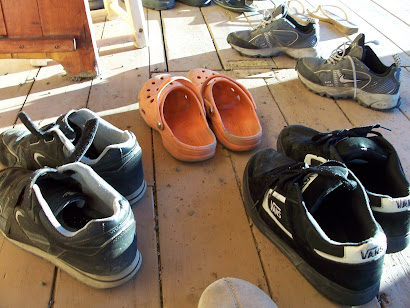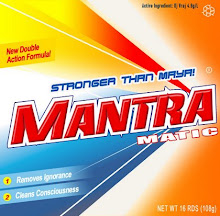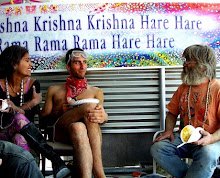 The best part of the last 4 months in Sridhama Mayapur has been attending early morning Srimad Bhagavatam class given by His Holiness Bhakti Vidya Purna Swami at the boys' gurukula (school). The long path that goes from temple and stretches across the opulent marigold fields and rice paddies is the most beautiful path on campus. The ground is soft and squeezes between your toes, making it practically intolerable to walk with shoes on.
The best part of the last 4 months in Sridhama Mayapur has been attending early morning Srimad Bhagavatam class given by His Holiness Bhakti Vidya Purna Swami at the boys' gurukula (school). The long path that goes from temple and stretches across the opulent marigold fields and rice paddies is the most beautiful path on campus. The ground is soft and squeezes between your toes, making it practically intolerable to walk with shoes on. 
The boys' gurukula was built a few years ago and is currently occupied by 20 or so young boys. The older boys live here while the younger boys go back home in the evenings. However, this no ordinary boarding school. This gurukula is exclusively reserved for exceptional young boys who exhibit the qualities of brahmanas. Krishna tells us in the Bhagavad Gita that peacefulness, self-control, austerity, purity, tolerance, honesty,wisdom, knowledge, and religiousness are the qualities by which the brahmanas work (18.42). Thus, brahmanas are recognized and determined by one's character and not by one's birth (although commonly misunderstood as such). The purpose of this school is to provide an education to young boys in order to ensure their further development into spiritually, mentally, and physically strong brahminical men and genuinely qualified spiritual leaders of today's world. No ordinary school, no ordinary architecture. The building itself is a work of art. The amount of detail in the gardens and walkways is simply amazing.
No ordinary school, no ordinary architecture. The building itself is a work of art. The amount of detail in the gardens and walkways is simply amazing. No ordinary classroom. Here is the main classroom that Srimad Bhagavatam class is given in every morning. Imagine the sun just rising and smoke billowing from small clay pots where cow dung paddies are burned to purify the air and ward off mosquitoes. The dew begins to evaporate as Maharaja begins class with a soft kirtan and the chanting of the Hare Krishna maha mantra. The atmosphere is surcharged with beauty, wisdom, and virtue.
No ordinary classroom. Here is the main classroom that Srimad Bhagavatam class is given in every morning. Imagine the sun just rising and smoke billowing from small clay pots where cow dung paddies are burned to purify the air and ward off mosquitoes. The dew begins to evaporate as Maharaja begins class with a soft kirtan and the chanting of the Hare Krishna maha mantra. The atmosphere is surcharged with beauty, wisdom, and virtue. No ordinary hallways, no ordinary hall pass. The walkways here remind me of Swiss Family Robinson meets Never Never Land. Although a new building, there is an undeniable sense of antiquity and a feeling of ancient knowledge and technology in every structure.
No ordinary hallways, no ordinary hall pass. The walkways here remind me of Swiss Family Robinson meets Never Never Land. Although a new building, there is an undeniable sense of antiquity and a feeling of ancient knowledge and technology in every structure. No ordinary bedroom. Yes, here is a small hut where some of the boys will sleep at night. The way the structure is designed and with the cow dung floors and straw roof, the enclosure makes for warm nights and transcendental dreams.
No ordinary bedroom. Yes, here is a small hut where some of the boys will sleep at night. The way the structure is designed and with the cow dung floors and straw roof, the enclosure makes for warm nights and transcendental dreams.
 No ordinary kitchen. The entire school is immaculate. The boys are instructed in first-class cleanliness standards and the teachers demand nothing less. The boys are also trained to cook and all take turns preparing breakfast and lunch. Everything is made from scratch and, of course, 100% vegetarian.
No ordinary kitchen. The entire school is immaculate. The boys are instructed in first-class cleanliness standards and the teachers demand nothing less. The boys are also trained to cook and all take turns preparing breakfast and lunch. Everything is made from scratch and, of course, 100% vegetarian.
 No ordinary stove top. These are wood-fired stoves made out of clay and cow dung. Every day the boys must collect enough wood to fire the cooking stoves. The boys learn not only the art of traditional Indian cooking but other styles as well.
No ordinary stove top. These are wood-fired stoves made out of clay and cow dung. Every day the boys must collect enough wood to fire the cooking stoves. The boys learn not only the art of traditional Indian cooking but other styles as well. No ordinary shower. Here is the bathing faucet and communal shower stall. The water is pumped from a well which supposedly keeps the water warm in the winter and cool in the summer.
No ordinary shower. Here is the bathing faucet and communal shower stall. The water is pumped from a well which supposedly keeps the water warm in the winter and cool in the summer.  No ordinary shoes.
No ordinary shoes. No ordinary deities. The gurukula altar and temple room is full of Lord Nrsimhadeva deities. The boys are instructed in deity worship and primarily worship Lord Nrsimhadeva, the half man/half lion form of Lord Krishna who bestows protection unto all who take shelter of Him. This young student and pujari carefully introduces all of the deities and lovingly explains their histories and pastimes. His name is Caitanya das and he is one of the oldest students. His maturity and character astonishes me for a boy his age. Move over Harry Potter, your magic school got nothing on this gurukula.
No ordinary deities. The gurukula altar and temple room is full of Lord Nrsimhadeva deities. The boys are instructed in deity worship and primarily worship Lord Nrsimhadeva, the half man/half lion form of Lord Krishna who bestows protection unto all who take shelter of Him. This young student and pujari carefully introduces all of the deities and lovingly explains their histories and pastimes. His name is Caitanya das and he is one of the oldest students. His maturity and character astonishes me for a boy his age. Move over Harry Potter, your magic school got nothing on this gurukula.
 No ordinary school, no ordinary architecture. The building itself is a work of art. The amount of detail in the gardens and walkways is simply amazing.
No ordinary school, no ordinary architecture. The building itself is a work of art. The amount of detail in the gardens and walkways is simply amazing. No ordinary classroom. Here is the main classroom that Srimad Bhagavatam class is given in every morning. Imagine the sun just rising and smoke billowing from small clay pots where cow dung paddies are burned to purify the air and ward off mosquitoes. The dew begins to evaporate as Maharaja begins class with a soft kirtan and the chanting of the Hare Krishna maha mantra. The atmosphere is surcharged with beauty, wisdom, and virtue.
No ordinary classroom. Here is the main classroom that Srimad Bhagavatam class is given in every morning. Imagine the sun just rising and smoke billowing from small clay pots where cow dung paddies are burned to purify the air and ward off mosquitoes. The dew begins to evaporate as Maharaja begins class with a soft kirtan and the chanting of the Hare Krishna maha mantra. The atmosphere is surcharged with beauty, wisdom, and virtue. No ordinary hallways, no ordinary hall pass. The walkways here remind me of Swiss Family Robinson meets Never Never Land. Although a new building, there is an undeniable sense of antiquity and a feeling of ancient knowledge and technology in every structure.
No ordinary hallways, no ordinary hall pass. The walkways here remind me of Swiss Family Robinson meets Never Never Land. Although a new building, there is an undeniable sense of antiquity and a feeling of ancient knowledge and technology in every structure. No ordinary bedroom. Yes, here is a small hut where some of the boys will sleep at night. The way the structure is designed and with the cow dung floors and straw roof, the enclosure makes for warm nights and transcendental dreams.
No ordinary bedroom. Yes, here is a small hut where some of the boys will sleep at night. The way the structure is designed and with the cow dung floors and straw roof, the enclosure makes for warm nights and transcendental dreams. No ordinary kitchen. The entire school is immaculate. The boys are instructed in first-class cleanliness standards and the teachers demand nothing less. The boys are also trained to cook and all take turns preparing breakfast and lunch. Everything is made from scratch and, of course, 100% vegetarian.
No ordinary kitchen. The entire school is immaculate. The boys are instructed in first-class cleanliness standards and the teachers demand nothing less. The boys are also trained to cook and all take turns preparing breakfast and lunch. Everything is made from scratch and, of course, 100% vegetarian. No ordinary stove top. These are wood-fired stoves made out of clay and cow dung. Every day the boys must collect enough wood to fire the cooking stoves. The boys learn not only the art of traditional Indian cooking but other styles as well.
No ordinary stove top. These are wood-fired stoves made out of clay and cow dung. Every day the boys must collect enough wood to fire the cooking stoves. The boys learn not only the art of traditional Indian cooking but other styles as well. No ordinary shower. Here is the bathing faucet and communal shower stall. The water is pumped from a well which supposedly keeps the water warm in the winter and cool in the summer.
No ordinary shower. Here is the bathing faucet and communal shower stall. The water is pumped from a well which supposedly keeps the water warm in the winter and cool in the summer.  No ordinary shoes.
No ordinary shoes. No ordinary deities. The gurukula altar and temple room is full of Lord Nrsimhadeva deities. The boys are instructed in deity worship and primarily worship Lord Nrsimhadeva, the half man/half lion form of Lord Krishna who bestows protection unto all who take shelter of Him. This young student and pujari carefully introduces all of the deities and lovingly explains their histories and pastimes. His name is Caitanya das and he is one of the oldest students. His maturity and character astonishes me for a boy his age. Move over Harry Potter, your magic school got nothing on this gurukula.
No ordinary deities. The gurukula altar and temple room is full of Lord Nrsimhadeva deities. The boys are instructed in deity worship and primarily worship Lord Nrsimhadeva, the half man/half lion form of Lord Krishna who bestows protection unto all who take shelter of Him. This young student and pujari carefully introduces all of the deities and lovingly explains their histories and pastimes. His name is Caitanya das and he is one of the oldest students. His maturity and character astonishes me for a boy his age. Move over Harry Potter, your magic school got nothing on this gurukula.














No comments:
Post a Comment